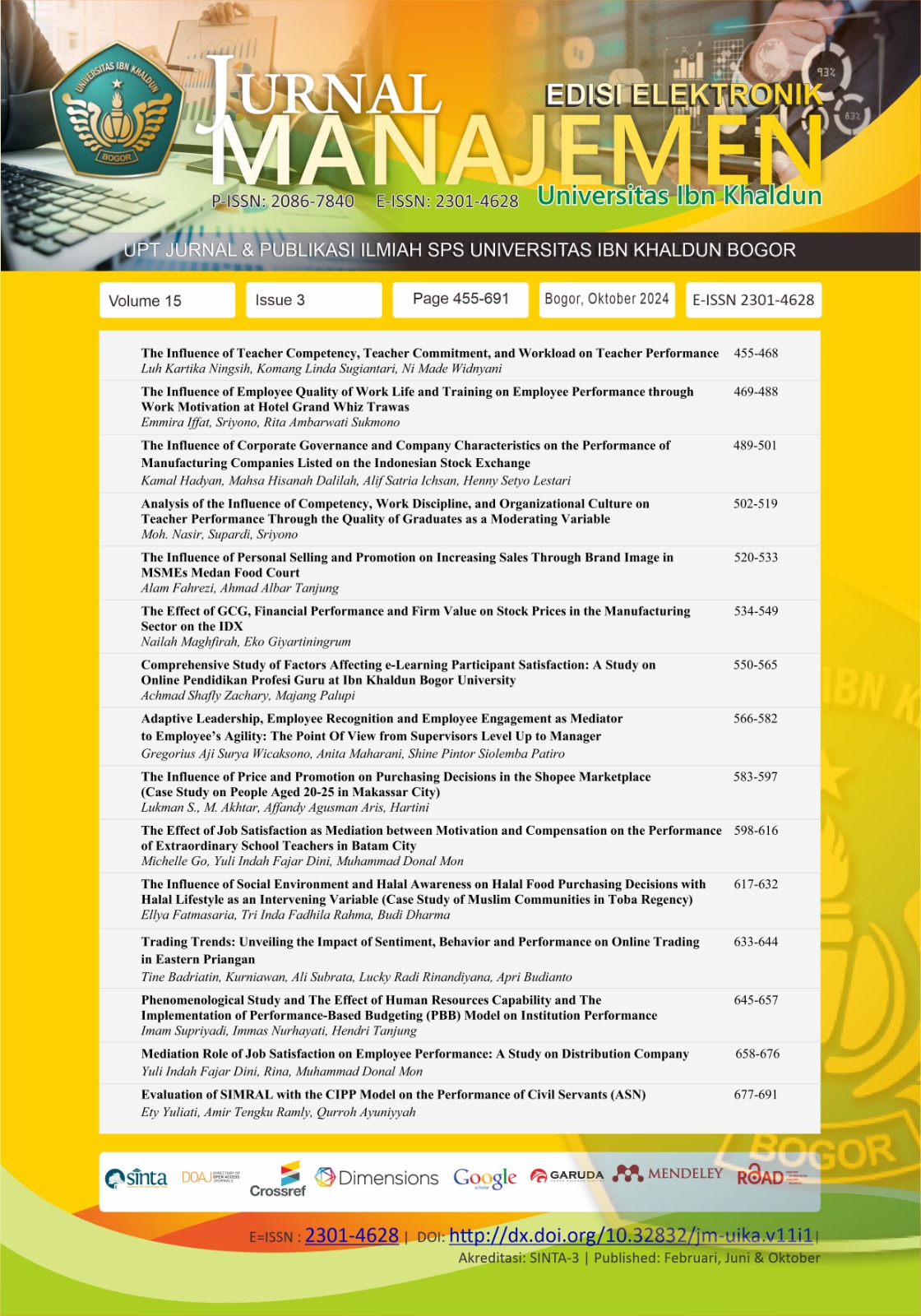Adaptive Leadership, Employee Recognition and Employee Engagement as Mediator to Employee’s Agility: The Point of View from Supervisors Level Up to Manager
DOI:
https://doi.org/10.32832/jm-uika.v15i3.17218Keywords:
Adaptive leadership, Employee recognition, Employee engagement, Employee’s agilityAbstract
There are three aims of this research: to determine the role of employee recognition on employee agility, the role of adaptive leadership on employee agility, and the role of employee engagement as a mediator between adaptive leadership and employee recognition on employee agility from supervisor’s level up to manager in a manufacturing company focuses in automotive in Jakarta. This research is based on a comprehensive review of existing literature on adaptive leadership, employee recognition, engagement, and agility. The research approach applied in this study is quantitative, using a Partial Least Square Structural Equation Modelling analysis approach. The data for this research was collected through purposive sampling, with the object of this research being one of the subsidiary companies that has implemented the employee agility approach. The findings of this research indicate that adaptive leadership does not have a significant positive influence on employee agility, nor does employee recognition. Additionally, employee engagement was found not to mediate the influence of employee recognition on employee agility.
References
Mrugalska, B., & Ahmed, J. (2021). Organizational Agility in Industry 4.0: A Systematic Literature Review. Sustainability, 13(15), https://doi.org/10.3390/su13158272.
Alhadid, A. (2016). The Effect of Organization Agility on Organization Performance. International Review of Management and Business Research Vol. 5 Issue.1.
Stan, M., & Puranam, P. (2016, Jun 6). Organizational adaptation to interdependence shifts: The role of integrator structures. Strategic Management Journal Vol 38, Issue 5. doi:https://doi.org/10.1002/smj.2546
Huber, G., Sutcliffe, K., Miller, C., & Glick, W. (1993). Understanding and predicting organizational. In G. Huber, & W. Glick, Organizational Change and Redesign (pp. 215-265). New York, NY: Oxford University Press.
AstraMagz. (2017, Mar). Astra Magazine. Retrieved from https://www.astra.co.id/Public/Files/ASTRAMAGZ_Maret2017_astranet_FA.pdf
CNN Indonesia. (2022, 10 22). Daihatsu Relokasi Pabrik Nomor 1 Sunter ke Karawang yang lebih Modern. Retrieved from cnnindonesia.com: https://www.cnnindonesia.com/otomotif/20221010100855-579-858426/daihatsu-relokasi-pabrik-nomor-1-sunter-ke-karawang-yang-lebih-modern
Stukes, K. S. (2021). Measuring Employee Engagement and Adaptive Leadership During Higher Education’s Accountability and Performance Era. North FLorida: University of North Florida ProQuest Dissertations Publishing.
Busse, R., & Weidne, G. (2020). A qualitative investigation on combined effects of distant leadership, organisational agility and digital collaboration on perceived employee engagement. Leadership & Organization Development Journal Volume 41 Issue 4, 535-550.
Bagwell, J. (2020). Leading Through a Pandemic: Adaptive Leadership and Purposeful Action. Vol. 5 No. S1 (2020): 5th Anniversary Special Issue: School Leadership During a Global Pandemic, pt. 1 / Special Issue. doi:https://doi.org/10.32674/jsard.v5iS1.2781
Pitafi, A. H., Liu, H., & Cai, Z. (2018). Investigating the relationship between workplace conflict and employee agility: The role of enterprise social media. Telematics and Informatics, 2157-2172. doi:https://doi.org/10.1016/j.tele.2018.08.001
Cote, R. (2022). Adaptive Leadership Approach With COVID 19 Adaptive Challenges. Journal of Leadership, Accountability & Ethics, 34-44.
Azmy, A. (2021). The Effect of Employee Engagement and Job Satisfaction on Workforce Agility Through Talent Management in Public Transportation Companies. Media Ekonomi dan Manajemen. doi:http://dx.doi.org/10.24856/mem.v36i2.2190
Sugiyono. (2017). Meotde Penelitian Kuantitatif, Kualitatif, dan R&D. Bandung: Alfabeta.
Ferdinand, A. (2014). Metode Penelitian Manajemen. Semarang: Universitas Diponegoro.
PT Astra International Tbk. (2018). LAPORAN TAHUNAN 2017: MEMBERDAYAKAN KEUNGGULAN INTERNAL. Jakarta: PT Astra International Tbk. Retrieved from https://cdn.indonesia-investments.com/bedrijfsprofiel/192/Astra-International-Annual-Report-2017-Company-Profile-Indonesia-Investments.pdf
Alessandrina, D. (2022, 08 02). Strategi Astra International Dorong Digitalisasi dan Prinsip Agility. Retrieved 06 15, 2024, from www.marketeers.com: https://www.marketeers.com/strategi-astra-international-dorong-digitalisasi-dan-prinsip-agility/
kumparanBISNIS. (2017, 02 24). Perjalanan Bisnis Astra dari Hanya Empat Karyawan Hingga Ratusan Ribu. Retrieved 06 10, 2024, from https://kumparan.com/kumparanbisnis/perjalanan-bisnis-astra-dari-hanya-empat-karyawan-hingga-ratusan-ribu
Boyar, S. L., Savage, G. T., & Williams, E. S. (2022). An Adaptive Leadership Approach: The Impact of Reasoning and Emotional Intelligence (EI) Abilities on Leader Adaptability. Employee Responsibilities and Rights Journal, 35, 565-580. 10.1007/s10672-022-09428-z.
Yang, T., Jiang, X., & Cheng, H. (2022). Employee Recognition, Task Performance, and OCB: Mediated and Moderated by Pride. Sustainability, 14, 1-13. https:// doi.org/10.3390/su14031631.
Liu, X. (., Yu, J. (., Guo, Q., & Li, J. (. (2022). Employee engagement, its antecedents and effects on business performance in hospitality industry: a multilevel analysis. International Journal of Contemporary Hospitality Management, 34(12), 4631-4652. https://doi.org/10.1108/IJCHM-12-2021-1512.
Konovalova, V. (2021). Employee Recognition Programs: Experience and New Reality. Management of the personnel and intellectual resources in Russia, 10(3), 25-30. DOI: 10.12737/2305-7807-2021-10-3-25-30.
Downloads
Published
How to Cite
Issue
Section
License
Copyright (c) 2024 Jurnal Manajemen (Edisi Elektronik)

This work is licensed under a Creative Commons Attribution-NonCommercial 4.0 International License.
Authors who publish with this journal agree to the following terms:
- Authors retain copyright and grant the journal right of first publication with the work simultaneously licensed under a Creative Commons Attribution-NonCommercial-ShareAlike 4.0 International License that allows others to share the work with an acknowledgement of the work's authorship and initial publication in this journal.
- Authors can enter into separate, additional contractual arrangements for the non-exclusive distribution of the journal's published version of the work (e.g., post it to an institutional repository or publish it in a book), with an acknowledgement of its initial publication in this journal.
- Authors are permitted and encouraged to post their work online (e.g., in institutional repositories or on their website) prior to and during the submission process, as it can lead to productive exchanges, as well as earlier and greater citation of published work (See The Effect of Open Access).











